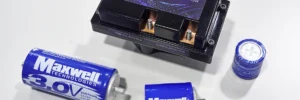The US administration’s BBB (which stands for Big Bill, and something else beginning with B) will be a disaster for American industry—it slashes support for clean energy technologies, ceding further ground to competitors in China and elsewhere. However, analysts who’ve combed through the fine print report that certain tax breaks for US battery plants survived the bloodbath.
At the last minute, our leaders reversed course and decided to preserve the Section 45X Advanced Manufacturing Production Credits for battery manufacturing. As the Battery Council puts it, “the 45X credits have already catalyzed billions in domestic investment and created thousands of good-paying manufacturing jobs across the country.”
“This vote sends a powerful message that America is committed to building and maintaining the world’s most advanced battery manufacturing ecosystem,” said Battery Council President Roger Miksad. “These credits don’t just support individual companies—they strengthen our entire domestic supply chain and ensure America remains the global leader [sic] in battery innovation.”
It remains to be seen how many EV-related projects will be cancelled or delayed because of cuts in federal funding and tax breaks, but at least one endangered battery factory has gained a new lease on life.
Early versions of the budget bill eliminated production tax credits for projects that used Chinese technology. This would have affected a $3-billion LFP battery plant that Ford is building in Marshall, Michigan, because the project will use technology licensed from Chinese battery giant CATL.
Chinese companies are years ahead of Western companies in battery technology. The fact that these companies have received billions of dollars’ worth of state support is called “unfair,” and is cited as a reason for the US to try to shut out Chinese products and technology. But as Michael Dunne, an expert on the Chinese auto industry puts it, “Americans can complain about it all they want, but China isn’t going to scrap this model just because we don’t like it.” It is nearly impossible to build batteries without using some Chinese technology, analysts and industry executives told the New York Times.
Apparently, cooler heads on Capitol Hill understand this, and were able to get changes made to the bill in order to allow some US battery projects, including Ford’s LFP plant, to proceed.
“The slight concessions in the final version of the legislation, which became clear only after experts had a chance to parse the fine print, suggest that at least some Republican lawmakers were aware that cuts in the bill would strike their constituents the hardest,” the New York Times reports. “Democratic legislation in 2022 inspired a boom in construction of battery factories and electric vehicle plants, primarily in Southern states where Republicans dominate.”
“Ford is committed to making the best, most cost-effective batteries for the next generation of electric vehicles in the United States,” the company said. “BlueOval Battery Park Michigan is on track to qualify for the production tax credit—a win for our customers and a win for American competitiveness.”
Speaking of fairness, Ford Executive Chairman William Ford Jr. told the Times that he and other execs were in touch with the White House almost daily, arguing that withdrawal of financial support promised by the Biden administration was unfair. “We made a certain investment based upon a policy that was in place,” said Mr. Ford. “It’s not fair to change policies after all the expenditure has been made.”
Sources: Battery Council, New York Times
from Charged EVs https://ift.tt/gf9pnRC


No comments:
Post a Comment